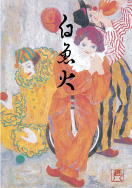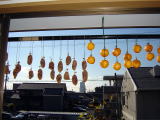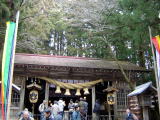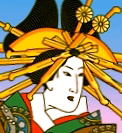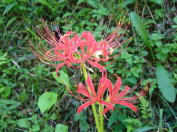| 最終更新日(update) '11.05.02 | ||
| 2006 | ||
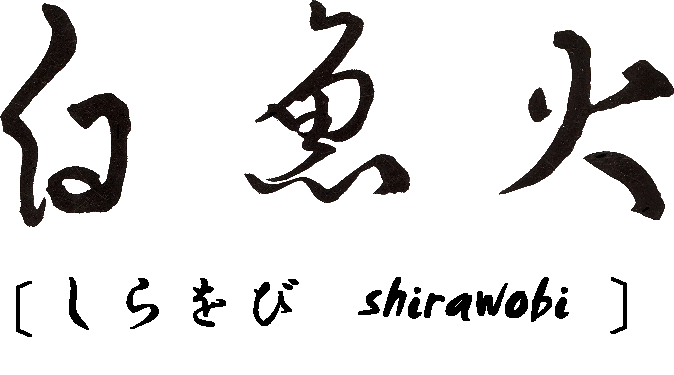 |
||
|
|
||
| ここに掲載の句は白魚火誌の“白魚火秀句”に掲載されたものの英訳です。 翻訳はホームページ担当者が行っていますので、作者の意に染まないところや名前の読み違いには直ぐに対応します。メール |
||
|
|
||
| Shirawobi is the name of a Haiku magazine and an association of Haiku
enthusiasts that has existed for fifty years in Shimane Prefecture, Japan. The following Haikus are written by the members of the Shirawobi group, selected by its chairperson Mr. Masafumi Nio, and rendered into English by its web-site editor. The words in the single brackets are Haikus in Japanese and those in double brackets are the authors' names. |
||
|
|
||
| Haikus Selected from '06 January edition of the Shirawobi |
| to '06 January Japanese page |
|
|
| (Wata-tsumi no yoko ich-retsu no go-jyuu nin) ((Oono Shizue)) the cotton field... over fifty people are picking cotton in a rank (Jyuu-san-ya roji ni azuki wo taku nioi) ((Tawara Keiko)) the moon thirteen nights old-- the boiling adzuki-beans smell on an alley *Jyuu-san-ya is the moon that is thirteen nights old in September. (Umi no oto yama no oto kiku hahaso chiru) ((Nishimura Matsuko)) the feeble sounds of the mountains and the ocean-- oak tree leaves fall (Asagao no tane ure te yuku jyun ni toru) ((Kotou Hiroe)) the seeds of morning glory mature everyday, I pick them in turn (Ketsuron wo isogu saga nari kaki no tane) ((Suzuki Keiko)) the seeds of kaki -- I was a jump-to-conclusion woman (Tobi-ishi wa on-na no ho-haba konomi otsu) ((Takama You)) the stepping stones are with women's step apart... the nuts are falling (Nittei no umari shi techou fuyu ni iru) ((Nakajima Keiko)) my pocket book was filled up with schedules... winter has come (Touka shitashi bunbou-shihou so-u ni kana) ((Masuda Ittou)) a fall lamplight-- a writing set for calligraphy is on my desk *One set of writing calligraphy equipment consists of writing brush, Japan paper, inkstone and India ink stick. (Itch-ban hikaru honshi sagasu hoshi-zukuyo) ((Oosaku Yoshinori)) I look for the brightest star... a bright and starry night (Mite shimau mada yawarakaki mozu no nie) ((Ooishi Masue) a raw victim by butcherbird, I witnessed (Kibukure te ori no soto ni wa hito ga iru) ((Ikeya Takahiko)) the humankind are outside the cage of zoo, being thickly dressed (Kosumosu no naka kosumosu no e wo shiagu) ((Hara Kazuko)) I have painted a picture of cosmoses in a cosmos bush |
|
|
| Haikus Selected from '06 February edition of the Shirawobi |
||||
| to '06 February Japanese page | ||||
|
|
||||
| (kon-nyaku-dama hosa re te minami-Shinano mura ) ((Kageyama Kaori)) balls of *konjak are dried in the cold wind in south *Shinano village *Konjak is a jelly-like food made from the starch of devils tongue. *Shinano is the old name of Nagano Prefecture where is highlands and surrounded by steep mountain ranges. (Hyon no fue fui te jishuku no tanjyou-bi ) ((Okuda Tsumoru)) I blow the flute of *Hyon-no-fue to celebrate my own birthday *Hyon-no fue is the natural-made flute that parasitic worm makes on the branch of a kind of Japanese witch hazel. (Shuwa no yubi kagayai te iru koharu kana) ((Yamaguchi Akio)) the fingers talking sign language looks joyful... Indian summer (Mushi nokoru yo wo kome te mau kagura kana) ((Takahashi Kakou)) late fall night-- the *Kagura dances are still performed before dawn... * Kagura is a local ceremony to dedicate secret music and dance to the God of their local shrine for good rice harvest. (Hitotsu ya no tsuma yori meeru yo no nagaki) ((Deguchi Satsue)) my husband *e-mailed me from another room of our house-- comfortable fall's night * This e-mail is sent through cell phone (Rin no naru *henro-zue kau fuyu-biyori) ((Asano Kazue)) I bought a pilgrim's stick with bells tinkle fine-- fine winter day * Henro is the religious people who visit 88 temples on foot in Shikoku to be saved by Buddha. They wear sacred kimono and have pilgrim's stick. Usually the stick have tiny Japanese bells on the top. (Shishi-michi no shimeri te ori nu zouki-yama)) ((Makizawa Sumie)) an animal trail of wild boar is wet... in a copse (Asa-zuke ni yuzu no choppiri kagen kana) ((Tsunoda shizuyo)) I made lightly pickled vegetables with a bit of citron (Sazanka no soba ni aratana keiji-ban) ((Ookubo Kifuu)) a hedge of Camellia... there is a brand-new bulletin board (Kagura hate Susanoo ga osu kuruma-isu) ((Takahashi Youko) after the *Kagura dance, the star walkes behind the wheel chair his mother is on (Ichi-ren no kaki no hoshi-basho hibi kawaru) ((Okuda Susae)) making *dried kakis, I move a string of peeled kakis daily to have chilly wind
(Hi-watari ya akiba no yama ni ko-yuki furu) ((Matsumoto Bun-ichi)) the sacred fire ceremony at *Akiba mountain-- it snows a little
|
||||
